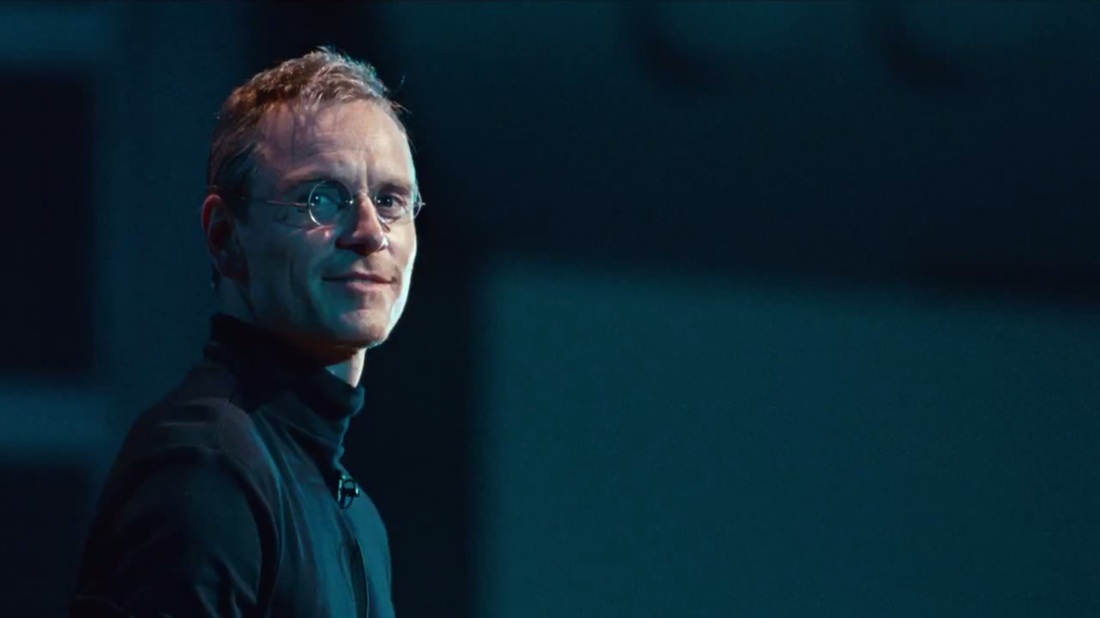In the midst of the movie’s many heated arguments, Apple co-founder Steve Wozniak piercingly asks “What do you do?”. Wozniak and Steve Jobs question the titular man’s real role, the man who never coded or engineered his projects yet still rose to the top of Silicon Valley. He’s become an object of fascination and an icon of genius, and Steve Jobs attempts to scrape those headlines for the flawed yet fascinating man underneath.
Steve Jobs, like the man, is not standard. Aaron Sorkin’s script is set in three acts, each before a presentation for one of Jobs’s new products pre-iPod era and divided by newscasts of Apple’s condition at the time. There’s no real storytelling as Sorkin aims to capture the essence of Jobs (played by Michael Fassbender) through quick responses and jabs at the people who repeatedly show up to restrict his intellect and force him to “think different.” Apple co-founder Steve Wozniak (Seth Rogen), CEO John Sculley (Jeff Daniels), and key designer Andy Hertzfeld (Michael Stuhlbarg) appear every act as the star musicians of Jobs’s orchestra, tired and critical of his direction. Each conversation is mesmerizing, as Sculley or Wozniak try to scrutinize a man who so fully believes he is doing the right thing. Sorkin’s script is a powerful stallion that both celebrates and challenges Jobs’s iconoclast status.
The woman of Jobs’s life also do not try to make his life easier. Christine Brennan (Katherine Waterston) and daughter Lisa frequently appear as the toughest bump in Jobs’s road: accepting paternity and, later, fatherhood. Their interactions provide a behind-closed-doors, intimate view of Jobs’s personal life, the movie milking this as his greatest weakness. His right-hand-woman, Joanna Hoffman (Kate Winslet, whose stunning performance unexpectedly made me cry), relentlessly shakes him into reality and their interactions are like emotional sparring contests. There’s a gorgeous sequence where Jobs recalls to her the story of a NASA spaceship and Director Danny Boyle superimposes footage of the rocket blasting off next to their silhouettes. It’s a glimpse of Jobs’s dazzling imagination and convincing prowess as he reminds Hoffman that he’s been doing everything with the end goal of running Apple in mind this entire time.
After an energetic two acts, the third act limps along and ends with a fizz. The saccharine, glitzy ending awkwardly contrasts the sharp, savage rest of the movie, and it really feels like Boyle wailed to have this ending be his moment. Despite expecting Boyle’s direction getting in the way of Sorkin’s vigorous script and Fassbender’s impeccable performance, I was admittedly excited for Steve Jobs. There were enough movies about Jobs before this one, yet I still gaped at the rehashed, edgy trailers and minimalist posters that featured the same mythology of a man. This is the best Steve Jobs movie because it attempts to dissect his “genius” while knowing what an impossible task that is. We learn that Steve Jobs is no God, and yet his mythology prevails even posthumously. What does that say for a film that casts a much more attractive Hollywood actor to portray a tech company CEO who's greatest contributions were minimalist design and unconventional thinking in the broad sense? That the ugly bits are worth absolving.
Grade: B

 RSS Feed
RSS Feed
